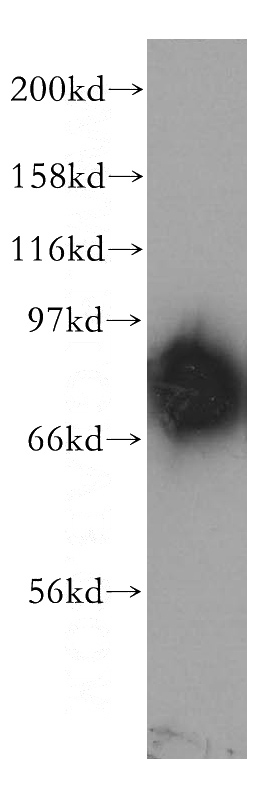-
Product Name
PDE4D antibody
- Documents
-
Description
PDE4D Rabbit Polyclonal antibody. Positive WB detected in mouse brain tissue, mouse pancreas tissue. Positive IHC detected in mouse colon tissue. Observed molecular weight by Western-blot: 91 kDa
-
Tested applications
ELISA, WB, IHC
-
Species reactivity
Human,Mouse,Rat; other species not tested.
-
Alternative names
DPDE3 antibody; HSPDE4D antibody; PDE43 antibody; PDE4D antibody; PDE4DN2 antibody; STRK1 antibody
-
Isotype
Rabbit IgG
-
Preparation
This antibody was obtained by immunization of PDE4D recombinant protein (Accession Number: NM_001197223). Purification method: Antigen affinity purified.
-
Clonality
Polyclonal
-
Formulation
PBS with 0.02% sodium azide and 50% glycerol pH 7.3.
-
Storage instructions
Store at -20℃. DO NOT ALIQUOT
-
Applications
Recommended Dilution:
WB: 1:500-1:5000
IHC: 1:50-1:500
-
Validations

mouse brain tissue were subjected to SDS PAGE followed by western blot with Catalog No:113663(PDE4D antibody) at dilution of 1:400
-
Background
PDE4D(cAMP-specific 3',5'-cyclic phosphodiesterase 4D) is also named as DPDE3, PDE43 and belongs to the cyclic nucleotide phosphodiesterase family and PDE4 subfamily. PDE4D subtype may be of particular importance as an antidepressant target in that it is regulated by repeated treatment with both norepinephrine and serotonin reuptake inhibitors as well as by the PDE4 inhibitor rolipram(PMID:16730340). It has at least 9 isoforms and all 9 PDE4D isoforms are expressed in healthy adult human hippocampus and in hippocampus from a patient with advanced Alzheimer disease(PMID:17353396).
-
References
- Major JL, Salih M, Tuana BS. Interplay between the E2F pathway and β-adrenergic signaling in the pathological hypertrophic response of myocardium. Journal of molecular and cellular cardiology. 84:179-90. 2015.
- Kim MJ, Park SK, Lee JH. Salt-Inducible Kinase 1 Terminates cAMP Signaling by an Evolutionarily Conserved Negative-Feedback Loop in β-Cells. Diabetes. 64(9):3189-202. 2015.
- Tsujimura K, Irie K, Nakashima H. miR-199a Links MeCP2 with mTOR Signaling and Its Dysregulation Leads to Rett Syndrome Phenotypes. Cell reports. 12(11):1887-901. 2015.
Related Products / Services
Please note: All products are "FOR RESEARCH USE ONLY AND ARE NOT INTENDED FOR DIAGNOSTIC OR THERAPEUTIC USE"
